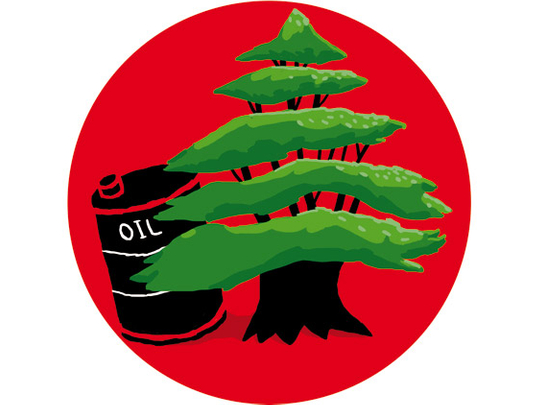
Newswire services have revealed that Lebanese President Michel Sulaiman has raised the super-sensitive offshore oil issue in the Eastern Mediterranean with his Syrian counterpart, President Bashar Al Assad. Sulaiman was quoted commenting: "There is an oil wealth in the sea which Israel began to extract. We think it is essential to take necessary measures to protect Lebanon's rights".
While secret explorations have confirmed the existence of substantial oil deposits along the northern maritime border, perhaps as much as eight billion barrels, the danger is that this new energy source will further muddy the waters for the hapless country. To be sure, eight billion barrels is a minuscule figure when compared to Saudi Arabia's 267 billion barrels of proven reserves, but quite positive when contrasted with Algeria's 12 billion or Libya's 41 billion.
Presumed estimates for natural gas were equally enlightening, especially in the ‘Leviathan' offshore field along the maritime border with Israel, which may contain 16 trillion cubic feet (tcf) of natural gas, half of which should belong to Beirut. According to the US-based Noble Energy Company, two large gas fields known as ‘Tamar' and ‘Leviathan' straddle the Lebanese-Israeli marine frontiers and potentially contain 8.4 tcf and 16 tcf of natural gas, respectively. Like oil deposits in the north, the two gas fields are modest when compared to the Qatari-Iranian North Dome reservoir, which exceeds 900 tcf. They compare favourably, however, with the Saudi-Iraqi neutral zone field at Dorra (35 tcf).
Needless to say that the Leviathan field, which is located about 130 kilometres northwest of the city of Haifa, at a depth of 1,700 metres, is of particular interest to Lebanon since it clearly stretches into Lebanese territorial waters. It may also be worth noting that the distance between Haifa and Beirut is 127 kilometres.
Still, when Israel declared that it was planning to take control of the Leviathan gas field, the news panicked Beirut, which is why wily politicians who seldom rush for a decision sought one urgently. Otherwise mediocre officials, who mastered the art of perpetual plotting to enrich themselves, scrambled to draft legislation to allow offshore oil and gas drilling along the country's undefined southern maritime frontier with Israel and northern borders with Syria.
There are now three fundamental concerns that touch on this critical question. First, conflicting views over whether the Cabinet or the parliament should be entitled to study and approve a draft law essentially mean that Lebanon's perennial sectarian political preferences will, once again, endanger the felicitous adoption of a necessary legal tool. Regrettably, the chief reason for this failure is the country's time-tested and incredibly baffling factionalism that, in the words of the late Fouad Chehab, has produced nothing more than a class of fromagistes (cheese eaters) who have helped themselves and continue to do so at will. The selfless Chehab, who has had no equal in the presidency to date, understood that excessive politicisation of every single national issue meant that nothing could ever be accomplished. He warned about career sectarian political leaders, whose priorities centred on personal agendas — hence the appropriate cheese-eating label.
Wasting time
Second, as Leban-on's latest fromagistes convened, politicians ensured that the legal jockeying received undue attention. In other words, most wasted time on internal procedures that should have been settled among responsible Cabinet officers, parliamentarians, and members of the bureaucracy a long time ago. The notion of preparation to better serve country and nation(s) seldom crossed these challenged minds. In this instance, few officials were equipped and ready to negotiate a demarcation of the maritime borders with Israel, most efficiently through applicable United Nations bodies. While Israel telegraphed its intentions to contravene the existing 1949 armistice, few Lebanese worried about full-speed exploitation of offshore oil and gas resources, to best protect intrinsic interests.
Third, as Lebanon lacked an Ahmad Zaki Yamani, who masterfully shepherded tough negotiations between the Saudi government and Aramco from the mid-sixties to the mid-eighties, the time is long overdue to appoint an Oil Tsar for the country. Truth be told, little will get done in Beirut, unless a non-fromagiste is in charge.
Press reports over the weekend emphasised that Al Assad was frustrated by Sulaiman's position on the subject, allegedly because Damascus suspected that Lebanon had embarked on this legal quest to satisfy Washington and/or the UN Special Envoy Terje Roed-Larsen, by reaching a border agreement with Israel. Syria may be correct to perceive covert western demands, though Israeli oil and gas explorations should not be neglected either, and protecting Beirut's national interests is worth every sacrifice.
If in the past Israel looked enviously at Lebanon's most precious resource, water, and prepared for future military engagements to secure this vital lifeline, it is now urgent to add oil and gas to this list of potential sources of conflict between the two countries. Given all that may be at stake, it behooves Lebanese fromagistes to think of the country for a change, rather than concentrate on lining their deep and already amply filled pockets.
Dr Joseph A. Kechichian is a commentator and author of several books on Gulf affairs.










